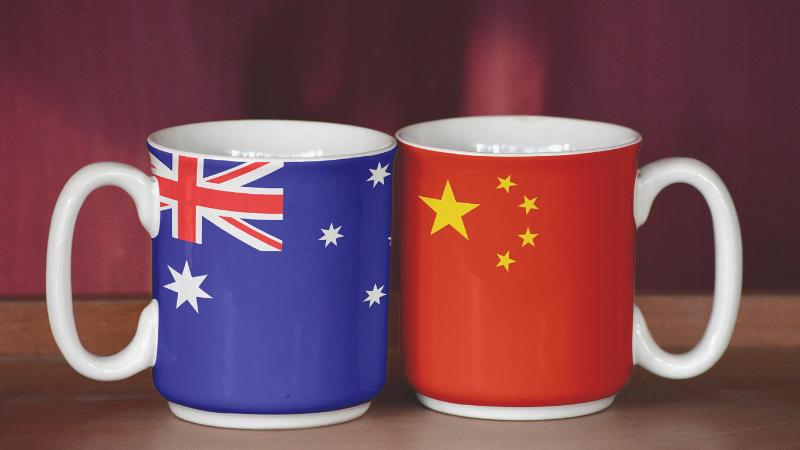Perspectives | The Australia-PRC relationship: What do Australians think?
July 23 2021

Perspectives is UTS:ACRI's commentary series, featuring a piece on a topical subject in the Australia-China relationship from an invited expert contributor.
The political relationship between Australia and the People’s Republic of China (PRC) has been enduring significant difficulties since 2017, with the last year a particularly turbulent period. The PRC’s economic coercion has started to bite and Canberra’s pushback against Beijing has reached a new intensity. In both Canberra and Washington there now appears to be a solid consensus across party lines on the need to respond to the PRC’s rise more forcefully.
Against this backdrop, the Australia-China Relations Institute (UTS:ACRI) and the Centre for Business Intelligence & Data Analytics (BIDA) at the University of Technology Sydney surveyed 2000 Australians across all states and territories earlier this year in an inaugural annual poll. [1] The UTS:ACRI/BIDA Poll 2021 sought to take the Australian public’s pulse on current aspects of, and recent events in, the Australia-PRC relationship with a view to better understanding this immediate past and some of the trends which may shape its future.
A complicated picture emerges from the poll findings. Australians are still clearly grappling with a number of questions that attach themselves to the Australia-PRC relationship and have not settled on one clear-cut position across all dimensions.
The majority of Australians see the benefits of the bilateral relationship (62 percent), want better ties between the two countries (61 percent) and believe that the responsibility for improving the frosty relationship lies with both Canberra and Beijing (80 percent). (Although when pressed on an either-or proposition, more Australians agreed that the responsibility lies with the PRC (48 percent) rather than Australia (30 percent)).
But they are also significantly troubled about many aspects of the relationship (74 percent), are deeply mistrustful of Beijing (76 percent) and think that Australia may ultimately benefit from the adoption of a harder government line on China (63 percent).
Australians are generally supportive of their government adopting a strong stance when it comes to navigating areas of disagreement, with only 28 percent agreeing with the statement that ‘The Australian government should not publicly call out actions by the Chinese government that Australia disagrees with’. The Australian government’s call on April 19 last year for an independent, international inquiry into the origins and spread of COVID-19, a source of diplomatic tension between Australia and the PRC, was believed to be the right course of action by 72 percent of Australians.
The poll results seem to indicate that the image of the PRC as the source of Australian prosperity may be in the process of slipping from view. While the majority agree that the PRC is and has been the source of Australia’s national wealth (63 percent) and that trade with (65 percent), and foreign investment from (50 percent), the PRC has created job opportunities in Australia, it is now, even if only slightly, seen as a relationship that carries too many risks going forward on a range of economic factors.
Australians are near-united in the belief that Australia has become too economically reliant on China (80 percent). Just over half of Australians say that Australia’s economic relationship with the PRC is more of a risk than an opportunity (53 percent) and that foreign investment from the PRC is more detrimental than beneficial (51 percent).
While Australian anxieties about investment from the PRC is not a particularly new phenomenon, with clear reservations held in the past about, for example, Chinese investment in residential real estate and agricultural assets, these apprehensions persist, and may have been intensified by the current environment.
A majority of Australians say that ownership by PRC companies of Australian agricultural assets such as land and food processing facilities are more concerning that ownership by companies from other countries (65 percent) and presents a threat to Australia's food security (70 percent).
Most Australians say that investment from buyers from the PRC in residential real estate drives up housing prices (82 percent); makes it difficult for first home buyers (69 percent); and negatively affects the rental market (69 percent). A clear majority of Australians (78 percent) believe that Australia should restrict the amount of investment in residential real estate that is permitted from PRC investors.
Australians want some of the good times to roll on – most particularly in the area of tourism and education. About three-quarters of Australians (74 percent) say that tourists from China provide a major economic benefit to Australia. Sixty-three percent say that Australia ought to continue work towards making the country an attractive destination for tourists from the PRC and just over half (51 percent) say that encouraging tourism from the PRC needs to be a post-COVID-19 priority for Australia.
On education, just over three-quarters of Australians (76 percent) say that international students from the PRC provide a major economic benefit to Australia. That said, a clear majority of Australians (81 percent) also harbour reservations about Australian universities' financial reliance on these students. Encouraging international students from China to return to study in Australia is deemed by less than half of Australians (45 percent) to be post-COVID-19 priority.
Australians are also generally supportive of business ties between Australia and China continuing to be forged (61 percent). While Australians also express reservations about such ties due to the PRC government’s domestic policies – such as its record on human rights, domestic censorship of the media, internet and other forms of communication, and record on environmental practices – these are presently somewhat muted.
There is also significant support for Australia and the PRC working cooperatively together in multilateral fora address regional issues such malaria elimination (72 percent) and to address global issues such as climate change (74 percent).
While this shows that Australians are not yet willing to give up on the relationship entirely, there is a chance we may be seeing the gradual erosion of a viable foundation for the bilateral relationship going forward. The touch points of cooperation have probably never been further apart than they are now. Suspicions and mistrust of the PRC are rife, touching almost every area of national life, from freedom of speech at universities to cybersecurity to the undermining of Australian values and traditions. Sixty-seven percent of Australians say that the PRC is a security threat to Australia.
The COVID-19 pandemic has only served to accentuate this suite of concerns, with 62 percent of Australians saying their view of the PRC has gotten more negative since the start of COVID-19.
One particularly worrying aspect is the impact that fallout from Australia-PRC tensions is having on social cohesion domestically. Sixty-three percent of Australians believe that political tensions are negatively impacting Australians of Chinese background. About four in 10 Australians (39 percent) say they believe that ‘Australians of Chinese origin can be mobilised by the Chinese government to undermine Australia’s interests and social cohesion’.
Intriguingly, the poll results seem to suggest that a majority of Australians still believe that the country can continue to enjoy the benefits of both the US and PRC relationships. For the moment, the idea that Australians can maintain this delicate balancing act with its main security partner and largest trading partner holds: most Australians (63 percent) are generally confident that Australia can continue to maintain good relations with both countries simultaneously. A minority of Australians (33 percent) believe that Australia's alliance with the United States is weakened by its relationship with the PRC.
But this has the potential to be the last gasp of an idea that has held sway in Australian thinking since the late 1990s, that Australia could, with astute and prudent management, enjoy the benefits of the US security umbrella while also taking the fistful of dollars from Beijing. The results here are show that this idealised version of Australia’s strategic and economic future still retains something of a purchase in the national imagination, but this grip may be tenuous. This is especially seen in the result that while many Australians are unconvinced that Canberra is managing Australia’s relationship with the PRC well, with only 32 percent indicating satisfaction with the Australian government’s handling of PRC policy, others want the government to go harder in its management of the relationship (63 percent).
That 45 percent of respondents would support the US in a war with the PRC over Taiwan likewise suggests that the old formula of being able to ride two horses simultaneously may be on the brink of collapse. Asked which of the powers - the US or the PRC - has more influence in the region, the majority of Australians (65 percent) say that the PRC is more influential. This may suggest that the portents of relative American decline are starting to be felt at the public level and stoking anxieties. Australia appears to have made its choice, and its strategic policy is locked into the goal of maintaining US primacy in East Asia.
If in 2014 former Prime Minister Tony Abbott said that what motivated Australians on the PRC was a combination of ‘fear and greed’, it might be said that it is now the former gaining the upper hand in shaping Australian attitudes and opinions. What the poll results show, in some ways, is the cumulative effect of a rolling narrative about PRC anxieties in the national debate. These findings could, on the one hand, herald the start of a tipping point, or, on the other hand, mark an amplification of uncertainties that have attached themselves to the bilateral relationship over the last few decades. Only future polls will reveal whether these results precede a tipping point in one clear direction or whether this ambiguity can persist despite the current unprecedented strain. All told, the reality of complexity for a relationship which is in a state of turbulence but on which people still have a mixed view is unsurprising.
Elena Collinson is Senior Project and Research Officer at the Australia-China Relations Institute, University of Technology Sydney.
Notes
[1] Responses were collected via an online survey with participants recruited via a commercial panel, the Online Research Unit (ORU). Responses were collected from Australian adults across all Australian states and territories with Australian Census-based quotas applied to age and gender. State quotas were set at obtaining a minimum of 200 responses from Tasmania, the Australian Capital Territory, Northern Territory, Western Australia, and South Australia, a minimum of 300 from Victoria and Queensland, and 400 from New South Wales. The total sample size consisted of 2000 complete responses. Responses were collected between March 22 2021 and April 11 2021.

